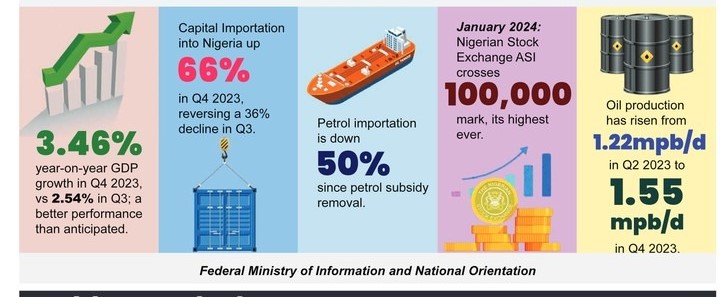In a landscape of economic challenges and uncertainties, President Bola Tinubu’s administration has embarked on bold reforms to steer Nigeria towards sustainable growth and prosperity. These reforms, though met with initial skepticism and discomfort, are beginning to yield promising results, signaling a hopeful trajectory for Nigeria’s economy.
One of the cornerstone reforms undertaken by President Tinubu was the courageous dismantling of petrol subsidy upon assumption in office, a move that reverberated across the nation. While it initially led to significant price hikes, averaging 163 percent, it was a necessary step to liberate Nigeria from the grip of dependency. Such measures, albeit painful, are essential for laying the groundwork for long-term economic resilience.
Furthermore, the shift towards a unified, market-reflective foreign exchange rate has unlocked doors to easier access to foreign exchange and imported inputs. This may guarantee a future fostering an environment where Nigerian entrepreneurs can pursue their dreams without the looming threat of currency instability. President Tinubu’s administration has set the stage for a more conducive business environment, conducive to growth and innovation.
The Nigeria Development Update, a report by the World Bank, echoes the sentiment of hope, highlighting the positive impact of Tinubu’s reforms on the economy. Despite initial challenges, including inflation reaching nearly 30 per cent annually, the report emphasises the necessity of continuity in sustaining these reforms. It underscores the importance of complementary actions and interventions to alleviate the hardships faced by vulnerable households.
The results of the reforms speak volumes. In the fourth quarter of 2023, Nigeria witnessed a commendable 3.46 per cent year-on-year GDP growth, outperforming the previous quarter. Capital importation into the country surged by 66 per cent, reversing a decline experienced earlier. Additionally, the removal of the petrol subsidy has led to a significant reduction in importation, signaling progress towards fiscal sustainability.
Moreover, Nigeria’s stock exchange ASI crossed the historic 100,000 mark in January 2024, reflecting investor confidence and optimism in the nation’s economic prospects. With the recent clampdown on crude oil theft by security agencies, oil production has also seen an uptick, further bolstering the country’s revenue streams and economic resilience.
However, it is crucial to acknowledge that these reforms have not been without their challenges. Many Nigerians have borne the brunt of temporary hardships, as acknowledged by the president himself, who referred to them as “baby steps of pains” necessary for fixing Nigeria’s deep-rooted problems. No doubt, rising inflation and the depreciation of the naira have tested the resilience of households and exacerbated the cost-of-living crisis.
Nevertheless, international rating agencies have shown confidence in Nigeria’s economic trajectory, with S&P Global Ratings revising its outlook to stable and Moody’s Investors Service upgrading Nigeria’s credit outlook to positive. These endorsements underscore the growing recognition of President Tinubu’s administration’s commitment to fiscal prudence and economic stability.
The present administration’s economic reforms mark a significant milestone in Nigeria’s journey towards sustainable growth. While challenges stare us all in the face, continued reforms and targeted interventions must be implemented to uplift millions of Nigerians out of poverty.




















